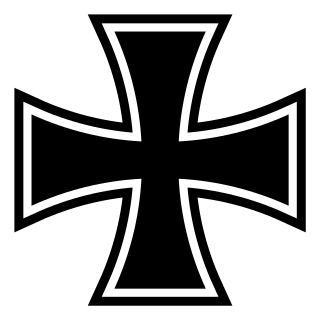
The Iron Cross was a military decoration in the Kingdom of Prussia, and later in the German Empire (1871–1918) and Nazi Germany (1933–1945). The design, a black cross pattée with a white or silver outline, was derived from the insignia of the medieval Teutonic Order and borne by its knights from the 13th century. As well as being a military medal, it has also been used as an emblem by the Prussian Army, the Imperial German Army, and the Reichswehr of the Weimar Republic, while the Balkenkreuz variant was used by the Wehrmacht. The Iron Cross is now the emblem of the Bundeswehr, the modern German armed forces.

Georg Otto Hermann Balck was a highly decorated officer of the German Army who served in both World War I and World War II, rising to the rank of General der Panzertruppe.

Hans-Valentin Hube was a German general during World War II who commanded armoured forces in the invasions of Poland, France and the Soviet Union. In the course of the war, Hube led the 16th Infantry Division, XIV Panzer Corps, and the 1st Panzer Army rising to the rank of Generaloberst. He died in an air crash on 21 April 1944.
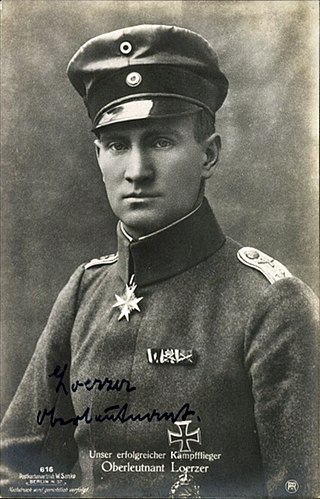
Bruno Loerzer was a German air force officer during World War I and World War II. Credited with 44 aerial victories during World War I, he was one of Germany's leading flying aces, as well as commander of one of the first Imperial German Air Service Jagdeschwaders.
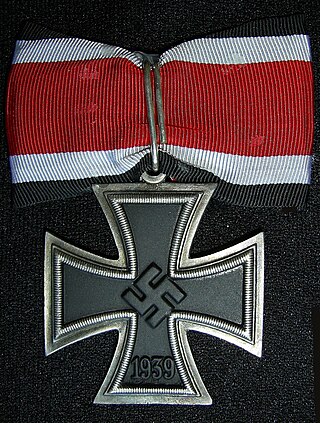
The Knight's Cross of the Iron Cross, or simply the Knight's Cross , and its variants, were the highest awards in the military and paramilitary forces of Nazi Germany during World War II.

Theodor "Theo" Osterkamp was a German fighter pilot during World War I and World War II. A flying ace, he achieved 32 victories in World War I. In World War II, he led Jagdgeschwader 51 up to the Battle of Britain and claimed a further six victories during World War II, in the process becoming one of only a few men to score victories and become an ace in both world wars.

Smilo Walther Hinko Oskar Constantin Wilhelm Freiherr von Lüttwitz was a German general during World War II and son of Walther von Lüttwitz. After World War II he joined the Bundeswehr on 1st June 1957 and retired on 31 December 1960.
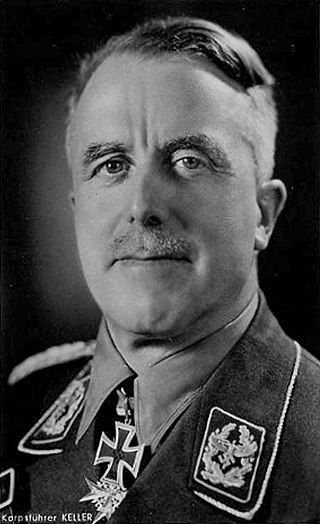
Alfred Keller was a general in the Luftwaffe of Nazi Germany during the Second World War who commanded the Luftflotte 1. His career in the Imperial German Armed Forces began in 1897; he served as a bomber pilot in World War I.

Otto Deßloch was a German Luftwaffe general during World War II and recipient of the Knight's Cross of the Iron Cross with Oak Leaves of Nazi Germany.

Duke Charles of Mecklenburg was a member of the House of Mecklenburg-Strelitz and a Prussian soldier who served in the Napoleonic Wars. From 1827 until his death he was President of the Prussian State Council.
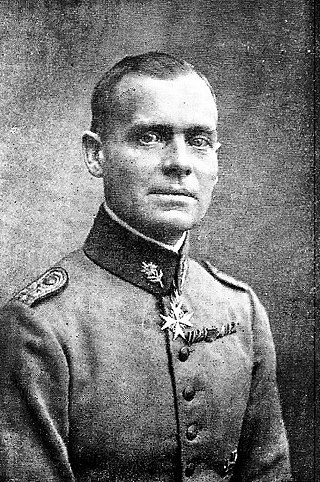
Heinrich Kirchheim was a German generalleutnant who served in both World War I and World War II. He is also one of few German officers who were awarded the Pour le Mérite and the Knight's Cross of the Iron Cross. He also served as a deputy member on the "Court of Military Honour," a drumhead court-martial that expelled many of the officers involved in the 20 July Plot from the Army before handing them over to the People's Court.

Kuno-Hans von Both was a German general during World War II. He was a recipient of both the Pour le Mérite of the German Empire and the Knight's Cross of the Iron Cross of Nazi Germany. He was also awarded the Nazi Party Blood Order by Adolf Hitler for his participation in Nazi activities prior to Adolf Hitler's rise to power.
Kurt von der Chevallerie was a German general in the Wehrmacht during World War II who commanded the German 1st Army. He was a recipient of the Knight's Cross of the Iron Cross with Oak Leaves. Chevallerie retired from the Army on 31 January 1945 and was missing in action since 18 April 1945 near Kolberg.
August Schmidt was a highly decorated General der Flakartillerie in the Luftwaffe during World War II. He was also a recipient of the Knight's Cross of the Iron Cross. The Knight's Cross of the Iron Cross was awarded to recognise extreme battlefield bravery or successful military leadership. August Schmidt was captured by British troops on 8 May 1945. In October 1947 he was sentenced to life imprisonment because of war crimes committed against captured British airman. His sentence was later reduced to ten years, and in 1950 he was released due to health reasons.
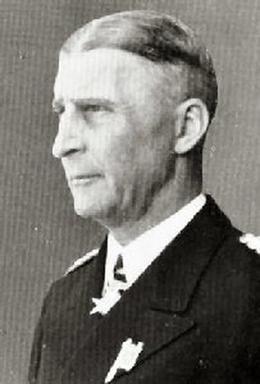
Otto Schultze was a Generaladmiral with the Kriegsmarine during World War II and a recipient of the Pour le Mérite during World War I. The Pour le Mérite was the Kingdom of Prussia's highest military order for German soldiers until the end of World War I. As a U-boat commander during World War I, he was credited with the sinking of 53 merchant ships for a total of 132,567 gross register tons, and HMS Falmouth of 5,275 long tons (5,360 t) displacement.

Gustav Adolf von Wulffen was a German highly decorated officer in the Wehrmacht with the rank of Generalmajor and SS-Officer with the rank of SS-Brigadeführer. He was decorated with the highest prussian decoration for bravery, Pour le Mérite on April 21, 1918, as Battalion Commander.

Karl Freiherr von Plettenberg was a Prussian officer, and later General of Infantry during World War I. He was Commandant-General of the Guards Corps, Adjutant General of the German Kaiser Wilhelm II and a recipient of Pour le Mérite.

Maximilian August Hermann Julius von Laffert was a Saxon officer, later General of Cavalry during World War I. He was a recipient of the Pour le Mérite.
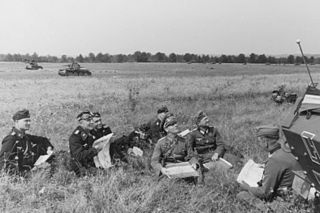
Karl Eduard August Rothenburg was a higly decorated German officer in the Wehrmacht during World War II. He was a recipient of both the Pour le Mérite and the Knight's Cross of the Iron Cross of Nazi Germany. Between wars he served as a commander in the police force, before returning to the Wehrmacht in 1934. During World War II he was the commander of a Panzer Regiment of the 7th Panzer Division. Rothenburg was killed six days into the invasion of the Soviet Union on 28 June 1941 near Minsk, Belarus and was posthumously promoted to Generalmajor.

Wilhelm Ludwig Erich Felix von Tschischwitz was a German General of the Infantry who participated in World War I. He was part of the Imperial German General Staff during the German spring offensive as well as commanding the Reichswehr after the war concluded.


















